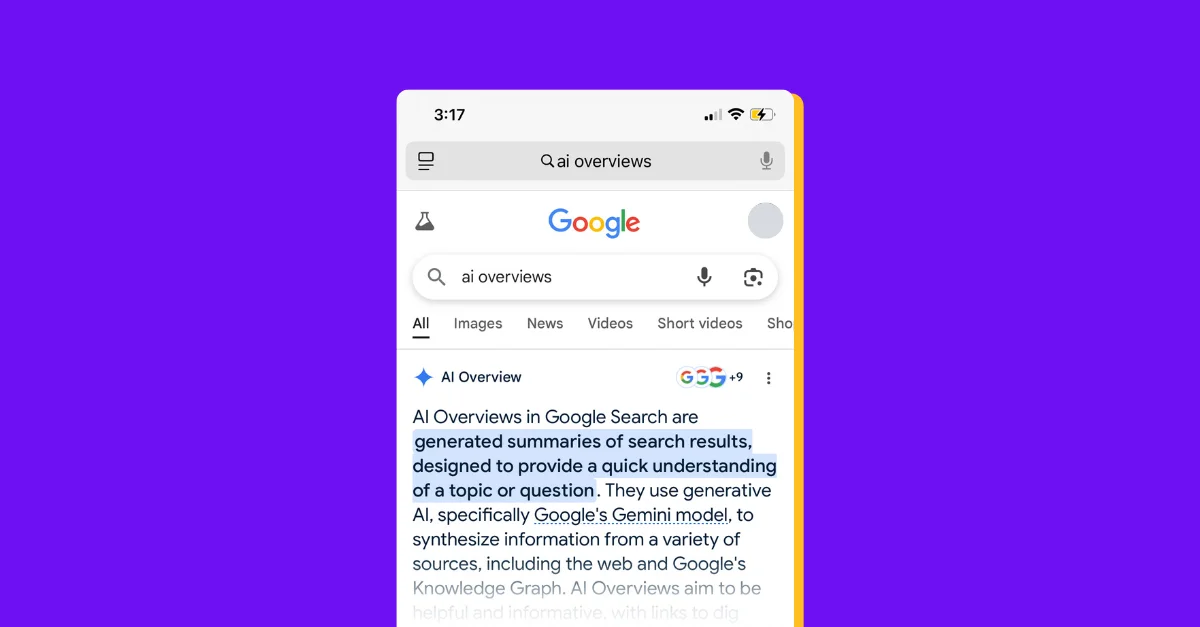Artificial intelligence (AI) is no longer a technology reserved only for big companies. Nearly all US small businesses (98%) use AI-enabled tools. Moreover, 91% of small businesses using AI say it will help their business grow in the future.
This poses the question: Should small businesses create an AI policy for their company?
In this article, we’ll cover what an AI policy is, why your business needs one, how to create an AI policy for your business, and the best practices to follow. Plus, we’re sharing a helpful template to get you started. Let’s dive in!
Contents
- What is an AI policy?
- Why do you need an AI policy?
- How to write an AI policy for your business
- Best practices for creating an effective AI policy
- AI policy template
What is an AI policy?
An AI policy is a set of rules and guidelines that outline how AI tools can—and can’t—be used in your business. An AI policy ensures AI is used safely, ethically, and strategically to achieve your business goals. It helps employees understand where AI fits into their day-to-day work, and how they can make the most of AI without sacrificing quality.
Creating an AI policy can help you reflect your company’s values, manage risks, and stay compliant with industry regulations.
🤖 Make sure you’re using AI the right (and most effective) way. Free download >> Emergency Guide to AI in Marketing
Why do you need an AI policy?
Small businesses are tapping into the potential of AI to increase efficiency and optimize processes. Whether it’s using AI-powered chatbots to handle customer inquiries 24/7, leveraging predictive analytics to forecast sales, or using AI in marketing, small businesses are betting on AI to help them work smarter.
The best part: the number of AI use cases is growing by the day. From automating tedious tasks and providing personalized experiences to using AI to optimize ad campaigns and generate content for social media, AI is transforming how small businesses operate and communicate.
However, the transformative power of AI requires responsible use. The fact that AI is now an inseparable part of doing business makes creating an AI policy a top priority for companies. Here’s why:
- Promotes responsible and safe use of AI tools: AI can help you level the playing field. But as you embrace AI you need to make sure your team responsibly uses the technology. Here’s where an AI policy comes into the picture. An AI policy helps keep your tools in check, ensuring that everyone uses them responsibly and ethically.
- Enhances awareness and leverages AI capabilities: Having an AI policy helps you demystify AI and ensure your team knows why they should care and how to make the most of it.
- Fosters a culture of AI innovation: A good AI policy encourages innovation, pushing your team to experiment with AI tools and find new ways to make your business run smoother. It’s about fostering a mindset that embraces AI as an ally, not a threat, while still respecting some rules.
- Minimizes risks: There’s no doubt that AI comes with risks. A solid policy helps you identify and mitigate risks before they affect your business. It gives you a framework for handling everything from data security to ethical dilemmas, ensuring that your business stays protected as you scale.
- Supports your business on its mission: A well-crafted AI policy ensures that the technology aligns with your mission, helping you streamline operations, deliver better customer experiences, and ultimately grow. Whether you’re looking to automate processes or drive innovation, the policy acts as a roadmap to keep AI in service of your bigger vision.

This sample AI policy outlines its purpose at the very beginning so employees know what to expect.
🚀 Want to learn how AI can supercharge your ads strategy? Free guide >> 9 Powerful Ways to Use AI in Google & Facebook Ads
How to write an AI policy for your business
If you are not sure where to start, we’ve prepared a step-by-step guide to help you address all the important aspects and create a comprehensive AI policy for your business. By following these steps, you can create an effective policy that aligns with your business goals, mitigates risks, and fosters trust with your employees and customers.
1. Define the purpose and scope of AI use
Before diving head first into AI, you should specify the scope and the business purposes for which authorized AI applications can be used. This will help promote trust and credibility. The basic purpose of an AI policy is to provide clear guidelines and ensure consistency and compliance.
🤔 What are the biggest challenges small businesses are facing? Find out that and more in our Small Business Marketing Trends Report.
2. Address data privacy and security concerns
The AI boom brought new challenges for data privacy and security. Risks such as sensitive data collection, use of data without permission, and data leakage highlight the urgent need for AI policy for every business that uses this technology. You must address the biggest security risks, such as sharing proprietary data, sensitive client information, or internal documents into public AI tools.
You should regularly audit your AI systems vulnerabilities and ensure that your data handling practices align with industry standards. Remember, data privacy and security should be at the core of your AI policy.
3. Ensure legal and regulatory compliance
When integrating AI into your business, it’s essential to stay informed and compliant with relevant laws and regulations. The use of AI can intersect with several areas of law, from data privacy to intellectual property, so understanding the legal framework around these issues is crucial.
The main goal is to protect sensitive business and customer information, maintain compliance with regulatory standards, and ensure compliance with data protection regulations such as GDPR (General Data Protection Regulation).
4. Establish ethical guidelines
AI needs boundaries. Set some ground rules for how you’ll use AI responsibly. For instance, make sure that the use of AI tools doesn’t lead to making biased decisions, whether it’s in hiring, customer service, or sales. Even though it can boost productivity and efficiency, AI can also reinforce biases.
That’s why it’s necessary to set guidelines for fact-checking. The AI policy should serve as a moral compass for your employees, making sure they understand what is the right way to use AI without exposing your business to risk and ethical mishaps.
5. Assess AI applications
AI tools have mushroomed in recent years. However, not every AI tool out there is going to be a good fit for your business. Before you start using AI, assess whether the tools you’re looking at actually solve a problem or make your business more efficient.
Your AI policy doesn’t need to list every single tool that’s approved, as that will change with the emergence of new tools. However, it should make clear what type of AI applications are approved and what is prohibited.
6. Establish accountability and governance
Use AI as an assistant, not a replacement for good judgment. By establishing accountability, you can trace AI-related actions back to individuals or teams, which is essential for proper oversight and responsibility. You also need to define accountability mechanisms, such as decision-making processes, defined responsibilities, and tracking systems.
AI governance ensures the responsible use of AI in your business by setting policies, procedures, and ethical standards to prevent misuse. It focuses on transparency, making sure that AI systems are clear and understandable to all stakeholders.
7. Implement monitoring and review processes
Your AI policy should not be set in stone. Technology changes, your business evolves, and new regulations come out constantly—what works today might not be relevant tomorrow. That’s why you need to set up a process for reviewing how well your AI tools are performing. From checking for accuracy and measuring the impact on your business to making sure they’re still secure, regular reviews will keep you ahead of any issues and make sure your AI is still driving value.
Best practices for creating an effective AI policy
- Keep it simple. Don’t overcomplicate your AI policy. Start with clear, straightforward guidelines that anyone in the business can follow. Keep it practical, actionable, and, most importantly, easy to understand.
- Clarify the kind of data employees can and cannot input into AI systems. Not all data is created equal. Some of it’s sensitive, some of it’s irrelevant, and some of it might just get you into legal issues. To avoid this, create a clear list of dos and don’ts to help your employees understand what they can feed into AI systems.
- Set up resources for training. Make sure there’s an ongoing training program that helps employees understand how to use AI tools safely and effectively. This isn’t about making them AI experts overnight, but rather giving them the confidence to use AI responsibly.
- Update it regularly. The AI landscape is evolving fast. What’s relevant today might be obsolete tomorrow, so it’s crucial to review and update your policy regularly. Set a schedule for policy check-ins and stay on top of changes in regulations, AI capabilities, and internal practices.
AI policy template
Here, you’ll find an AI policy template to help your business tackle AI integration, manage risks, and stay compliant. Consider this template as a starting point in developing a responsible AI usage policy. Make sure to adapt the template to fit your business needs and get legal assistance before final approval.
Get a copy of the template here >>
Accelerate your business growth with AI
AI holds a huge potential to help small businesses compete with bigger players. The key is to use AI responsibly. Creating an AI policy that reflects your company’s values and industry regulations is crucial to the responsible use of AI.
Want to discover how we can accelerate your business growth with AI-powered digital marketing solutions? Get a free demo.








